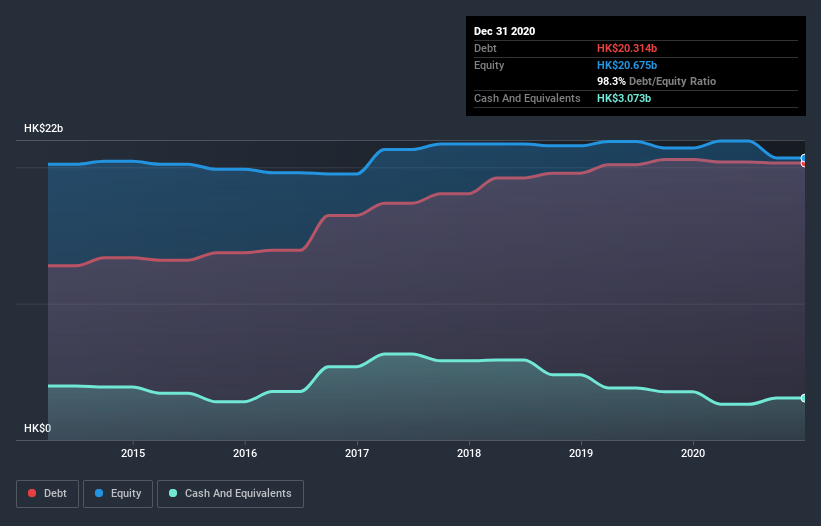
Howard Marks put it nicely when he said that, rather than worrying about share price volatility, 'The possibility of permanent loss is the risk I worry about... and every practical investor I know worries about.' When we think about how risky a company is, we always like to look at its use of debt, since debt overload can lead to ruin. Importantly, Paliburg Holdings Limited (HKG:617) does carry debt. But is this debt a concern to shareholders?
When Is Debt Dangerous?
Debt and other liabilities become risky for a business when it cannot easily fulfill those obligations, either with free cash flow or by raising capital at an attractive price. Ultimately, if the company can't fulfill its legal obligations to repay debt, shareholders could walk away with nothing. However, a more usual (but still expensive) situation is where a company must dilute shareholders at a cheap share price simply to get debt under control. Of course, debt can be an important tool in businesses, particularly capital heavy businesses. When we think about a company's use of debt, we first look at cash and debt together.
See our latest analysis for Paliburg Holdings
What Is Paliburg Holdings's Debt?
As you can see below, Paliburg Holdings had HK$20.3b of debt, at December 2020, which is about the same as the year before. You can click the chart for greater detail. However, it also had HK$3.07b in cash, and so its net debt is HK$17.2b.

A Look At Paliburg Holdings' Liabilities
We can see from the most recent balance sheet that Paliburg Holdings had liabilities of HK$16.1b falling due within a year, and liabilities of HK$9.97b due beyond that. On the other hand, it had cash of HK$3.07b and HK$881.0m worth of receivables due within a year. So its liabilities outweigh the sum of its cash and (near-term) receivables by HK$22.2b.
This deficit casts a shadow over the HK$2.32b company, like a colossus towering over mere mortals. So we definitely think shareholders need to watch this one closely. At the end of the day, Paliburg Holdings would probably need a major re-capitalization if its creditors were to demand repayment. When analysing debt levels, the balance sheet is the obvious place to start. But it is Paliburg Holdings's earnings that will influence how the balance sheet holds up in the future. So when considering debt, it's definitely worth looking at the earnings trend. Click here for an interactive snapshot.
Over 12 months, Paliburg Holdings made a loss at the EBIT level, and saw its revenue drop to HK$1.4b, which is a fall of 50%. That makes us nervous, to say the least.
Caveat Emptor
While Paliburg Holdings's falling revenue is about as heartwarming as a wet blanket, arguably its earnings before interest and tax (EBIT) loss is even less appealing. Its EBIT loss was a whopping HK$569m. Reflecting on this and the significant total liabilities, it's hard to know what to say about the stock because of our intense dis-affinity for it. Like every long-shot we're sure it has a glossy presentation outlining its blue-sky potential. But the reality is that it is low on liquid assets relative to liabilities, and it lost HK$874m in the last year. So we're not very excited about owning this stock. Its too risky for us. There's no doubt that we learn most about debt from the balance sheet. But ultimately, every company can contain risks that exist outside of the balance sheet. We've identified 2 warning signs with Paliburg Holdings , and understanding them should be part of your investment process.
If, after all that, you're more interested in a fast growing company with a rock-solid balance sheet, then check out our list of net cash growth stocks without delay.
If you’re looking to trade Paliburg Holdings, open an account with the lowest-cost* platform trusted by professionals, Interactive Brokers. Their clients from over 200 countries and territories trade stocks, options, futures, forex, bonds and funds worldwide from a single integrated account. Promoted
New: Manage All Your Stock Portfolios in One Place
We've created the ultimate portfolio companion for stock investors, and it's free.
• Connect an unlimited number of Portfolios and see your total in one currency
• Be alerted to new Warning Signs or Risks via email or mobile
• Track the Fair Value of your stocks
This article by Simply Wall St is general in nature. It does not constitute a recommendation to buy or sell any stock, and does not take account of your objectives, or your financial situation. We aim to bring you long-term focused analysis driven by fundamental data. Note that our analysis may not factor in the latest price-sensitive company announcements or qualitative material. Simply Wall St has no position in any stocks mentioned.
*Interactive Brokers Rated Lowest Cost Broker by StockBrokers.com Annual Online Review 2020
Have feedback on this article? Concerned about the content? Get in touch with us directly. Alternatively, email editorial-team (at) simplywallst.com.
About SEHK:617
Paliburg Holdings
Engages in the property investment and development, construction and building, and hotel ownership and operations businesses in Hong Kong, Mainland China, and internationally.
Good value with mediocre balance sheet.
Market Insights
Community Narratives





